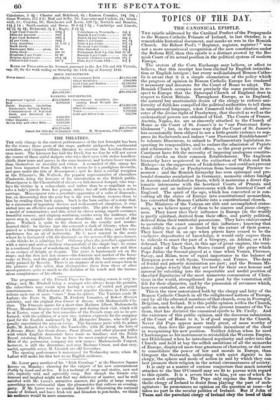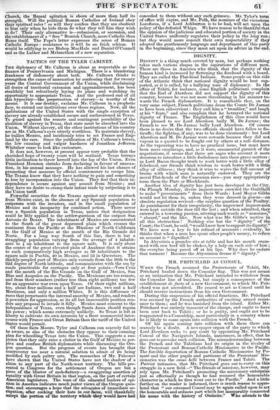TOPICS OF THE DAY.
THE CANONICAL EPISTLE.
THE epistle addressed by the Cardinal Prefect of the Propaganda to the Roman Catholic Primate of Ireland, in last October, is a remarkable historical document, and marks an tera in the Romish Church. Sir Robert Peel's " Register, register, register I " Was not a more unequivocal recognition of the new constitution under the Reform Bill, than this epistle is a distinct avowal by the Ro-, mish Court of its actual position in the political system of modern Europe.
The orators of the Corn Exchange may believe, or affect to
believe, that this rescript has been elicited by English intimida- tion or English intrigue ; but every well-informed Roman Cathaa lie is aware that it is a simple enunciation of the policy which: the progress of opinion in Roman Catholic Europe has rendered it necessary and decorous for the Court of Rome to adopt. The Romish Church occupies now precisely the' same position in re- spect to Europe that the Episcopal Church of England does in respect to Great Britain. Throughout Europe, as in England,' the natural but unattainable desire of the clergy to enforce uni- formity of faith has compelled the political authorities to tell them in unequivocal language, what Cromwell told the clerical advo-- cates of the divine right of Presbytery, that the civil as well as the ecclesiastical powers are ordained of God. The Courts of France, Austria, Naples &c. are as sincerely attached to the Church of Rome as the Naples, of St. James's is to "our Protestant Esta- blishment " ; but, in the same way that the Court of St. James's has occasionally been obliged to use a little gentle violence to sup- press its Sacheverels and induce "our Protestant Establishment" to tolerate Dissenters, to submit to Parliamentary legislation re- specting its temporalities, and to endure the admission of Papists and schismatics to high civil offices, so the great powers of the Continent have felt the necessity of imposing analogous constitu- tional checks on their common Establishment. The Anglican hierarchy have acquiesced in the extinction of Welsh and Irish Bishops—in the suppression of Irish tithes—and could not prevent a Roman Catholic or Presbyterian from becoming Premier to- morrow : and the Romish hierarchy has seen episcopal and pre- bendal domains secularized in Germany, monastic orders linute.d. in Austria and abolished in Spain, while it maintains a direct dip- lomatic intercourse with the heretical Courts of Prussia and Hanover and an indirect intercourse with the heretical Court of England. The spirit of the age, which has converted or is con- verting all the states of Europe into constitutional monarchies; has converted the Roman Catholic into a constitutional church.
The Ministers of the Vatican are able and accomplished states-
India, as we believe many of them to be sincere and pious clergy- men. They know that their influence in Europe (in the world) is partly spiritual, derived from their office, and partly- political, derived from their territorial possessions. They have endeavoured to ascertain the exact amount of this influence ; knowing that their ability to do good is limited by the extent of their power. They know that in an age when priests have ceased to be the exclusive depositaries of knowledge, it would only expose them to ridicule to enact the part of a Gregory, an Adrian, or a Hil- debrand. They know that, in this age of great empires, the terri- torial ruler of the Church States cannot play the game which Pope Julius the Second played at a time when Venice, Florence, Savoy, and Milan, were of equal importance in the balance of European power with Spain, Germany, and France. The days of feudal and priestly domination are past ; and the Roman Mi- nisters judge wisely that they act best for their own honour and interest by subsiding into the respectable and useful position of the chief aignitaries of the most numerous communion of Chris- tians in the world, strengthened for good by the veneration still felt for their character, and by the possession of revenues which, however curtailed, are still large.
This is the view entertained both by the clergy and laity of the
Roman Catholic Church in all the enlightened nations of Europe, and by all the educated members of that church, even in Portugal, Belgium, and Ireland. It is this public opinion within the Church, quite as much as the good sense of the present inmates of the Va- tican, that has dictated the canonical epistle to Dr. Crony. And the existence of this public opinion, and the decorous submission of the Court of Rome to it, is of good augury for the Church. Never did Pope appear more truly great, or more worthy- of esteem, than does the present venerable incumbent of the chair in recognizing his new position. Neither Adrian when he used Charlemagne as his instrument to reestablish the Western Empire, nor Hildebrand when he introduced regularity and order into the Church and held at bay the selfish ambitions of all the monarchs of Europe, displayed more true greatness of character, or did more to consolidate the power of law and morals in Europe, than Gregory the Sixteenth, indicating with quiet dignity to his clergy, the sphere and mode of action in and by which they can best promote their religion in the actual circumstances of society.
It is only as a matter of curious conjecture that much interest
attaches to the line O'Connell may see fit to pursue with regard to this epistle. It is a severe blow to him, yet one of which he cannot well complain. The Pope only enjoins the Roman Ca- tholic clergy of Ireland to desist from playing the part of molt- agitators: : he pronounces no opinion on the question at issue—he takes no part in the secular politics of Ireland. But if John of Tuam and the parochial clergy of Ireland obey the head of *it'
Church, the Repeal agitation is shorn of more than half its strength. Will the political Roman Catholics of Ireland obey their spiritual ruler! or will they confess that they are obedient to him only when he bids them do what they tell him they wish to.do ? . Their only alternative is—submission, or secession, and the establishment of a " free " Romish Church, more Catholic than Rome itself. The Pope's letter expresses the sense of Roman Catholic Europe : resistance to it will be an Irish schism. It Would be edifying to see Bishop MacHale and Daniel O'Connell end as the Luther and Melancthon of a new separation.



























 Previous page
Previous page